
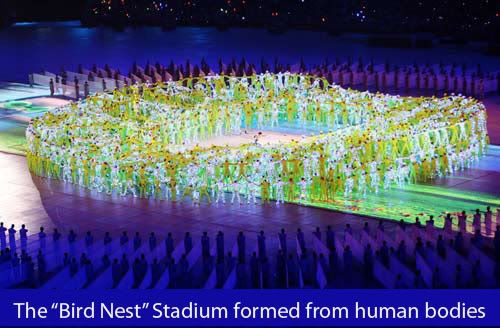
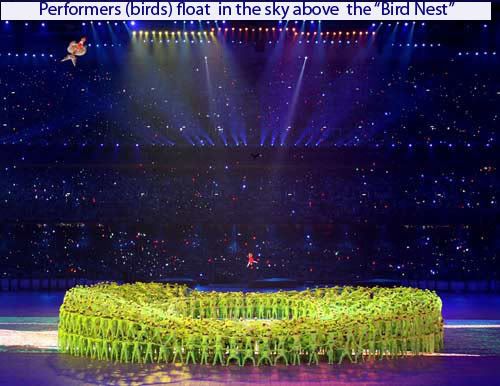
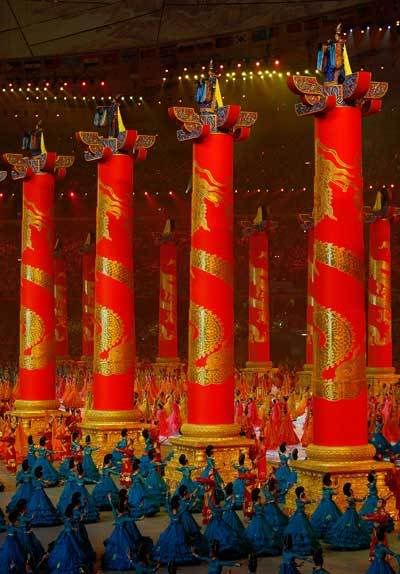
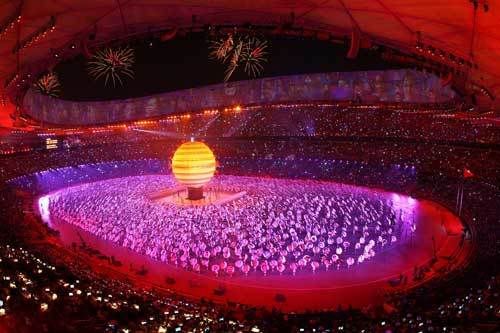
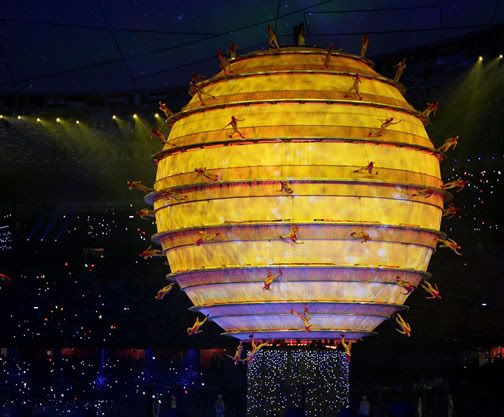
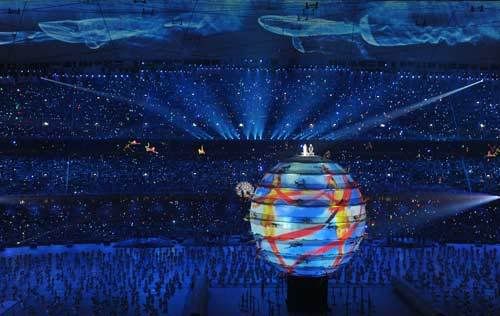
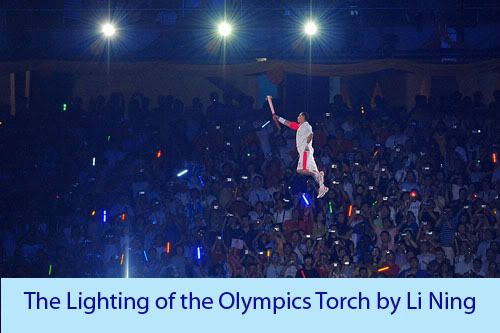
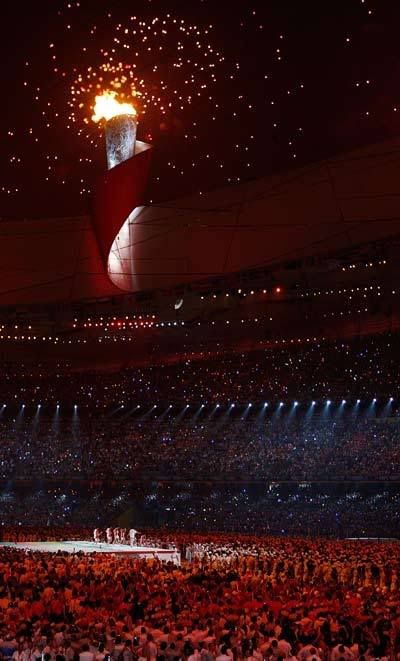
CLICK HERE TO SEE MORE PICTURES OF THE OPENING CEREMONY
You and Me - Beijing Olympic Song 2008
by
James Lawton
It was all that was promised here in the fabulous chameleon of the stadium known as the Bird's Nest. It then spread like the magic fire of some great forest across the vast and, for so long, hidden land.
This, it was hard if not impossible to dispute, was the greatest show the world had ever seen and it brought joy that became delirium in 1.3 billion people.
The launch of the 29th Olympics was so stunningly choreographed, so meticulous planned – full dress rehearsals were under way more than a year ago – and went so far back into China's ancient history you suspected that Confucius himself might have been pleased.
The father of Chinese philosophy did, after all, like a party, once declaring: "Friends have come from afar and how happy we are."
Not all friends of modern China were in the stadium last night – the worldwide TV audience was estimated at more than 4 billion – but even one of its greatest critics, the watching American President George Bush, was obliged at times to gasp and muster something more than polite applause.
Such reaction peaked at the dramatically staged climax, when the final bearer of the torch that had been so regularly attacked on its route around the world, the former gymnast Li Ning, was whisked on wires around what seemed to be the very eaves of the stadium before igniting the great cauldron.
What China and the world was seeing, though, was the greatest launching of the Olympics in the 112-year-history of the summer Games that started modestly in Athens, its former ancient home.
Last night's explosion of light and colour and, in the end, fierce emotion, inspired Jacques Rogge, the Belgian president of the International Olympic Committee, to declare: "One world – one dream. It is what we have tonight."
For a few hours last night the beauty and drama of China's version of its own history, seemed to have produced an international coming-out party to carry the world's most populous, and fast-developing nation, beyond the sniper fire of its most relentless critics.
The artistic director, Zhang Yimou, was the most relieved man in China last night. He said that he had increasingly felt the burden of his nation's honour, adding:
" For two years we have been working to perfect the task and it has been very arduous. There is a Chinese phrase about the most difficult tasks facing anyone. They are known as 'glorious and arduous.' This was all of that but it so was rewarding to see the reaction of everyone.Zhang Yimou's vision and artistic thrust is revealed in a series of notes. They describe how he came to his theme of China arriving at a changing point in its history. The notes were mostly concerned with the sweep and the rhythm of time, and the need to emphasise the Chinese grasp of their own history.
"What do the Olympic Games mean to the ordinary Chinese? Many would speak of their great significance and profound meaning but I heard someone say, 'They are for all our guests ... we should make them happy."
His starting point – "a dazzling light activating an ancient sundial, and then a series of special effects ... the sundial reflects the light on to the ancient fou. The fou is the ancient Chinese percussion instrument made of clay or bronze. In as early as the Xia and Shang dynasties there was the performance of the fou ..."
The fou reproduces the effect of thunder and so it was in the Bird's Nest stadium. It grew in the stadium and spread its way across the old city, and long before the storm was over even veteran observers of Olympic ritual were convinced that what they were seeing was unique in its impact and its range of emotion. This witness, who can go back to the Montreal Games of 1976, has to rate it the winner by a wide margin.
Perhaps both significantly and ironically, the nearest challenger is the effort of Seoul in 1988, when great churning war galleons stunningly represented the eternal battles of the Ying and the Yang.
Last night's performance of beauty and drama fit for the Olympic gods.
Whatever happens on the court, however, the Chinese – and the Olympics – will always have the night that captured the world.
The Meaning Behind the Spectacular Show
Read here article in Independent UK
by
Clifford Coonan
Giant scrolls? Human kites? An army of drummers? The smbols of the ceremony China used to tell its story to the world
Behind the dazzling performances and spectacular visuals there was an underlying theme at the opening ceremony that told the story of the Chinese civilisation and its greatest achievements, including drums that turned into writing desks
The opening ceremony was beautiful and breathtaking, intricate and pyrotechnically the last word, but what exactly did it all mean?
Scrolls? Chops? Puppets? So many drummers? Sarah Brightman?
For an event watched by four billion people, this was a visually spectacular undertaking and the fireworks were so good it worked on every demographic. It was also an incredibly cerebral show, with deeply symbolic elements that will resonate with Chinese even if they passed others by.
The thematic unity in the show was based on China's greatest achievements – the compass, gunpowder, paper, printing and the wheelbarrow, as well as its ancient art and the magnificence of the Great Wall.
Cue human kites, no less. And enormous scrolls, symbolising China's pioneering role in printing, and its ancient bureaucracy. One sequence featured what looked like thousands of human beings dressed as chops – the ink stamps which are everywhere in China and without which no document is complete.
Martial arts, too. Kung fu was a major feature, despite China's failure to have it installed as an Olympic sport. White-gowned tai-chi experts going through their paces, in their thousands, was always going to impress.
The references to the ancient art of paper-making, a favourite pastime of President Hu Jintao, bore this out. One gorgeous section was the way the square drums were transformed into writing desks and – seen from above – they all lit up in significant sequences, combining the visual sense with an intellectual element that is extremely Chinese.
All the mainstays of Chinese culture were there – the Great Wall, the Chinese opera puppets, even the astronauts from New China. While beautiful, the show was occasionally incoherent, especially to foreigners who do not understand the niceties of calligraphy in the Ming dynasty.
For students and fans of the Chinese director Zhang Yimou, the opening ceremony will have been relatively familiar territory, though the occasion was surprisingly low on the colour red, which has become his trademark hue from movies such as Raise the Red Lantern and Red Sorghum. Ironically, these were the movies which led him to be banned on a regular basis but they are also the Chinese Communist Party's colour of choice.
Zhang is not shy, and he has been open in saying that his opening ceremony would be no less than a distillation of 5,000 years of Chinese history, and would have to include elements of all that great tradition.
You can't help but wonder if it was dealing with such weighty matters that really scared Steven Spielberg off, not the doubts about China's Darfur policy.
An understanding of the ancient art of calligraphy is a useful aid in decoding the ceremony. Zhang has used calligraphy in his movies as a way of displaying Chinese resolve under pressure, as well as a sign of ingenuity. The athletes were brought out into the "Bird's Nest" stadium according to the character strokes, not in Western alphabet terms.
Involving a cast of 15,000 people, including 2,008 drummers, there were no references to Chairman Mao, class struggle, rightists, or any of the other mainstays in the Communist canon.
But making a temple out of thin air is something I am still working out how they did. Same with the Olympic rings, how did they do that?
The ceremony was successful in avoiding clichés about China, such as rickshaws and paddy fields. But it did open with a quote from the venerable Confucius: "Friends have come from afar, how happy we are."
No comments:
Post a Comment